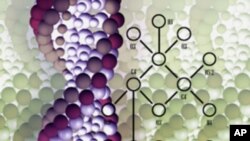Scientists report they have found a new way to change the genetic code within living cells, a discovery that could lead to effective treatments for inherited diseases caused by a common genetic mutation.
Researchers at the University of Rochester in New York studied a specific mutation in the human genetic code called a "premature stop codon" that is common to a number of diseases, including cystic fibrosis and muscular dystrophy. It is estimated that up to one-third of inherited disorders are caused by this defective piece of code.
The genetic code is a set of instructions in a gene that tells a cell how to make specific proteins, chemicals that are key to an organism's normal development and function. The premature stop codon, which scientists liken to a red stop light, is a mutation that orders cells to stop reading essential genetic instructions part-way through protein synthesis, resulting in an incomplete or shortened protein and potentially serious health consequences.
John Karijolich is the study’s lead author. “So what will happen when you have a [shortened] protein, you end up losing whole sections of the protein and whole parts of the protein that are engaged in reactions. So it would be the lack of those domains of the protein that results in disease," he said.
Researchers altered messenger RNA, or mRNA, the chemical which conveys the genetic instructions from DNA, so that the stop signal codon was changed, in effect, to a green light or “go” signal, producing normal, full-length protein strands. The scientists demonstrated the work in the test tube and in laboratory yeast.
Investigators created another type of RNA, called guide RNA, to target and fix stop-codons in regular RNA.
Karijolich hopes that one day RNA therapy can be administered to people with diseases like muscular dystrophy.
“It would have to be once the patient is diagnosed and it then would be like a form of treatment. It wouldn’t be a cure. It would have to be continual. If it was possible you would have to continually take this RNA supplement that would continue to direct the modification of this RNA stop-codon," he said.
An article on RNA repair is published in the journal Nature.












